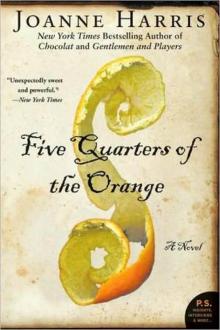- Home
- Joanne Harris
Chocolat Page 2
Chocolat Read online
Page 2
I nodded. “Stay in the garden.”
I wiped a smudge of dirt from the bridge of her nose. “You look a complete urchin.”
I saw her glance at the priest and caught her comical look just in time. “This is Monsieur Reynaud, Anouk. Why don’t you say hello?”
“Hello!” shouted Anouk on the way to the door. “Goodbye!” A blur of yellow jumper and red overalls and she was gone, her feet skidding manically on the greasy tiles. Not for the first time, I was almost sure I saw Pantoufle disappearing in her wake, a darker smudge against the dark lintel.
“She’s only six,” I said by way of explanation.
Reynaud gave a tight, sour smile, as if his first glimpse of my daughter confirmed every one of his suspicions about me.
THREE
Thursday, February 13
Thank God that’s over. Visits tire me to the bone. I don’t mean you, of course, mon pere; my weekly visit to you is a luxury, you might almost say my only one. I hope you like the flowers. They don’t look much, but they smell wonderful. I’ll put them here, beside your chair, where you can see them. It’s a good view from here across the fields, with the Tannes in the middle distance and the Garonne gleaming in the far. You might almost imagine we were alone. Oh, I’m not complaining. Not really. But you must know how heavy it is for one man to carry. Their petty concerns, their dissatisfactions, their foolishness, their thousand trivial problems…On Tuesday it was the carnival. Anyone might have taken them for savages, dancing and screaming. Louis Perrin’s youngest, Claude, fired a water-pistol at me, and what would his father say but that he was a youngster and needed to play a little? All I want is to guide them, mon pere, to free them from their sin. But they fight me at every turn, like children refusing wholesome fare in order to continue eating what sickens them. I know you understand. For fifty years you held all this on your shoulders in patience and strength. You earned their love. Have times changed so much? Here I am feared, respected…but loved, no. Their faces are sullen, resentful. Yesterday they left the service with ash on their foreheads and a look of guilty relief. Left to their secret indulgences, their solitary vices. Don’t they understand? The Lord sees everything. Isee everything. Paul-Marie Muscat beats his wife. He pays ten Avesweekly in the confessional and leaves to begin again in exactly the same way. His wife steals. Last week she went to the market and stole trumpery jewellery from a vendor’s stall. Guillaume Duplessis wants to know if animals have souls, and weeps when I tell him they don’t. Charlotte Edouard thinks her husband has a mistress — I know he has three, but the confessional keeps me silent. What children they are! Their demands leave me bloodied and reeling. But I cannot afford to show weakness. Sheep are not the docile, pleasant creatures of the pastoral idyll. Any countryman will tell you that. They are sly, occasionally vicious, pathologically stupid. The lenient shepherd may find his flock unruly, defiant. I cannot afford to be lenient. That is why, once a week, I allow myself this one indulgence. Your mouth is as closely sealed, mon pere, as that of the confessional. Your ears are always open, your heart always kind. For an hour I can lay aside the burden. I can be fallible.
We have a new parishioner. A Vianne Rocher, a widow, I take it, with a young child. Do you remember old Blaireau’s bakery? Four years since he died, and the place has been going to ruin ever since. Well, she has taken the lease on it, and hopes to reopen by the end of the week. I don’t expect it to last. We already have Poitou’s bakery across the square, and, besides, she’ll never fit in. A pleasant enough woman, but she has nothing in common with us. Give her two months, and she’ll be back to the city where she belongs. Funny, I never did find out where she was from. Paris, I expect, or maybe even across the border. Her accent is pure, almost too pure for a Frenchwoman, with the clipped vowels of the North, though her eyes suggest Italian or Portuguese descent, and her skin…But I didn’t really see her. She worked in the bakery all yesterday and today. There is a sheet of orange plastic over the window, and occasionally she or her little wild daughter appears to tip a bucket of dirty water into the gutter, or to talk animatedly with some workman or other. She has an odd facility for acquiring helpers. Though I offered to assist her, I doubted whether she would find many of our villagers willing. And yet I saw Clairmont early this morning, carrying a load of wood, then Pourceau with his ladders. Poitou sent some furniture; I saw him carrying an armchair across the square with the furtive look of a man who does not wish to be seen. Even that ill-tempered backbiter Narcisse, who flatly refused to dig over the churchyard last November, went over there with his tools to tidy up her garden. This morning at about eight-forty a delivery van arrived in front of the shop. Duplessis, who was walking his dog at the usual time, was just passing at that moment, and she called him over to help her unload. I could see he was startled by the request — for a second I was almost certain he would refuse — one hand halfway to his hat. She said something then — I didn’t hear what it was — and I heard her laughter ringing across the cobbles. She laughs a great deal, and makes many extravagant, comical gestures with her arms. Again a city trait, I suppose. We are accustomed to a greater reserve in the people around us, but I expect she means well: A violet scarf was knotted gypsy-fashion around her head, but most of her hair had escaped from beneath it and was streaked with white paint. She didn’t seem to mind. Duplessis could not recall later what she had said to him, but said in his diffident way that the delivery was nothing, only a few boxes, small but quite heavy, and some open crates containing kitchen utensils. He did not ask what was in the boxes, though he doubts such a small supply of anything would go very far in a bakery.
Do not imagine, mon pere, that I spent my day watching the bakery. It is simply that it stands almost immediately opposite my own house — the one which was yours, mon pere, before all this. Throughout the last day and a half there has been nothing but hammering and painting and whitewashing and scrubbing until in spite of myself I cannot help but be curious to see the result. I am not alone in this; I overheard Madame Clairmont gossiping self-importantly to a group of friends outside Poitou’s of her husband’s work; there was talk of red shutters before they noticed me and subsided into sly muttering. As if I cared. The new arrival has certainly provided food for gossip, if nothing else. I find the orange-covered window catches the eye at the strangest times. It looks like a huge bonbon waiting to be unwrapped, like a remaining slice of the carnival. There is something unsettling about its brightness and the way the plastic folds catch the sun; I will be happy when the work is finished and the place is a bakery once more.
The nurse is trying to catch my eye. She thinks I tire you. How can you bear them, with their loud voices and nursery manner? Time for our rest, now, I think. Her archness is jarring, unbearable. And yet she means kindly, your eyes tell me. Forgive them, they know not what they do. I am not kind. I come here for my own relief, not yours. And yet I like to believe my visits give you pleasure, keeping you in touch with the hard edges of a world gone soft and featureless. Television an hour a night, turning five times a day, food through a tube. To be talked over as if you were an object — Can he hear us? Do you think he understands? — your opinions unsought, discarded…To be closed from everything, and yet to feel, to think. This is the truth of hell, stripped of its gaudy mediaevalisms. This loss of contact. And yet I look to you to teach me communication. Teach me hope.
FOUR
Friday, February 14, St Valentine
The dog-man’s name is guillaume. He helped me with the delivery yesterday and he was my first customer this morning. He had his dog, Charly, with him, and he greeted me with a shy politeness which was almost courtly.
“It looks wonderful,” he said, looking around. “You must have been up all night doing this.”
I laughed.
“It’s quite a transformation,” said Guillaume. “You know, I’m not sure why, but I’d just assumed it was going to be another bakery.”
“What, and ruin poor Monsieur Poitou’s trade?
I’m sure he’d thank me for that, with his lumbago playing up the way it is, and his poor wife an invalid and sleeping so badly.”
Guillaume bent to straighten Charly’s collar, but I saw his eyes twinkle.
“I see you’ve met,” he said.
“Yes. I gave him my recipe for bedtime tisane.”
“If it works, he’ll be a friend for life.”
“It works,” I assured him. Then, reaching under the counter I pulled out a small pink box with a silver valentine bow on it. “Here. For you. My first customer.”
Guillaume looked little startled.
“Really, Madame, I—”
“Call me Vianne. And I insist.”
I pushed the box into his hands. “You’ll like them. They’re your favourite kind.”
He smiled at that. “How do you know?” he enquired, tucking the box carefully into his coat pocket.
“Oh, I can just tell,” I told him mischievously. “I know everyone’s favourite. Trust me, this is yours.”
The sign wasn’t finished until about noon. Georges Clairmont came to hang it himself then, profusely apologetic at his lateness. The scarlet shutters look beautiful against the new whitewash and Narcisse, grumbling halfheartedly about the late frosts, brought some new geraniums from his nursery to put in my planters. I sent them both away with valentine boxes and similar expressions of bemused pleasure. After that, barring a few schoolchildren, I had few visitors. It is always the case when a new shop opens in such a small village; there is a strict code of behaviour governing such situations and people are reserved, pretending indifference though inwardly they burn with curiosity. An old lady ventured in, wearing the traditional black dress of the country widow. A man with dark, florid features bought three identical boxes without asking what was inside. Then for hours, no-one came. It was what I expected; people need time to adapt to change, and though I caught several sharp glances at my display window, no-one seemed inclined to go in. Behind the studied unconcern however, I sensed a kind of seething, a whispering of speculation, a twitching of curtains, gathering of resolve. When at last they came, it was together; seven or eight women, Caroline Clairmont, wife of the signmaker, amongst them. A ninth, arriving somewhat behind the group, remained outside, her face almost touching the window, and I recognized the woman in the tartan coat.
The ladies eyed everything, giggling like schoolgirls, hesitant, delighting in their collective naughtiness.
“And do you make them all yourself?” asked Cecile, who owns the pharmacy on the main street.
“I should be giving it up for Lent,” commented Caroline, a plump blonde with a fur collar.
“I won’t tell a soul,” I promised. Then, observing the woman in the tartan coat still gazing into the window, “Won’t your friend join us?”
“Oh, she isn’t with us,” replied Joline Drou, a sharp featured woman who works at the local school. She glanced briefly at the square-faced woman at the window. “That’s Josephine Muscat.”
There was a kind of pitying contempt in her voice as she pronounced the name. “I doubt she’ll come in.”
As if she had heard, I saw Josephine redden slightly, lowering her head against the breast of her coat. One hand was drawn up against her stomach in an odd, protective gesture. I could see her mouth, perpetually downturned, moving slightly, in the rhythms of prayer or cursing.
I served the ladies — a white box, gold ribbon, two paper cornets, a rose, a pink valentine bow — amidst exclamations and laughter. Outside Josephine Muscat muttered and rocked and dug her large ungainly fists into her stomach. Then, just as I was serving the last customer she raised her head in a kind of defiance and walked in. This last order was a large and rather complicated one. Madame wanted just such a selection, in a round box, with ribbons and flowers and golden hearts and a calling card left blank — at this the ladies turned up their eyes in roguish ecstasy, hihihihil — so that I almost missed the moment. The large hands are surprisingly nimble, rough quick hands reddened with housework. One stays lodged in the pit of the stomach, the other flutters briefly at her side like a gunslinger’s swift draw, and the little silver packet with the rose — marked ten francs — has gone from the shelf and into the pocket of her coat.
Nice work. I pretended not to notice until the ladies had left the shop with their parcels. Josephine, left alone in front of the counter, pretended to examine the display, turned over a couple of boxes with nervous, careful fingers. I closed my eyes. The thoughts she sent me were complex, troubling. A rapid series of images flickered through my mind: smoke, a handful of gleaming trinkets, a bloodied knuckle. Behind it all a jittering undercurrent of worry.
“Madame Muscat, may I help you?”
My voice was soft and pleasant. “Or would you just like to look around?”
She muttered something inaudible, turned as if to leave.
“I think I may have something you’ll like.”
I reached under the counter and brought out a silver packet similar to the one I had seen her take, though this one was larger. A white ribbon secured the package, sewn with tiny yellow flowers. She looked at me, her wide unhappy mouth drooping with a kind of panic. I pushed the packet across the counter towards her.
“On the house, Josephine,” I told her gently. “It’s all right. They’re your favourites.”
Josephine Muscat turned and fled.
FIVE
Saturday, February 15
I know this isn’t my usual day, mon pere but I needed to talk. The bakery opened yesterday. But it isn’t a bakery. When I awoke yesterday morning at six the wrapping was off, the awning and the shutters were in place and the blind was raised in the display window. What was an ordinary, rather drab old house like all the others around it has become a red-and-gold confection on a dazzling white ground. Red geraniums in the window boxes. Crepe-paper garlands twisted around the railings. And above the door a hand-lettered sign in black on oak:
La Celeste Praline Chocolaterie Artisanale.
Of course it’s ridiculous. Such a shop might well be popular in Marseille or Bordeaux — even in Agen where the tourist trade grows every year. But in Lansquenet-sous-Tannes? And at the beginning of Lent, the traditional season of self-denial? It seems perverse, perhaps deliberately so. I looked into the display window this morning. On a white marble shelf are aligned innumerable boxes, packages, cornets of silver and gold paper, rosettes, bells, flowers, hearts and long curls of multicoloured ribbon. In glass bells and dishes lie the chocolates, the pralines, Venus’s nipples, truffles, mendiants, candied fruits, hazelnut clusters, chocolate seashells, candied rose-petals, sugared violets.. Protected from the sun by the half-blind which shields them, they gleam darkly, like sunken treasure, Aladdin’s cave of sweet cliches. And in the middle she has built a magnificent centrepiece. A gingerbread house, walls of chocolate-coated pain d’epices with the detail piped on in silver and gold icing, roof tiles of florentines studded with crystallized fruits, strange vines of icing and chocolate growing up the walls, marzipan birds singing in chocolate trees…And the witch herself, dark chocolate from the top of her pointed hat to the hem of her long cloak, half astride a broomstick which is in reality a giant guimauve, the long twisted marshmallows that dangle from the stalls of sweet-vendors on carnival days. From my own window I can see hers, like an eye closing in a sly, conspiratorial wink. Caroline Clairmont broke her Lenten vow because of that shop and what it sells. She told me in the confessional yesterday, in that breathless girlish tone which goes so ill with her promises of repentance.
“Oh, mon pere, I feel so dreadful about it! But what could I do when that charming woman was so sweet? I mean, I never even thought about it until it was too late, though if there’s anyone who should give up chocolates…I mean, the way my hips have absolutely ballooned in the last year or two, it makes me want to die—”
“Two Aves.” God, that woman. Through the grille I can feel her hungry, adoring eyes. She feigns chagrin at my abruptness.
“And remember why we fast for Lent. Not for vanity. Not to impress our friends. Not so that we can fit into next summer’s expensive fashions.” I am deliberately brutal. It is what she wants.
“Yes, I am vain, aren’t I?” A tiny sob, a tear, blotted delicately with the corner of a lawn handkerchief. “Just a vain, foolish woman.”
“Remember Our Lord. His sacrifice. His humility.” I can smell her perfume, something flowery, too strong in this enclosed darkness. I wonder whether this is temptation. If so, I am stone.
“Four Aves.”
It is a kind of despair. It frets at the soul, reduces it piece by piece, as a cathedral may be levelled over the years by the erosion of flying dust and fragments of sand. I can feel it chipping away at my resolve, my joy, my faith. I should like to lead them through tribulation, through wilderness. Instead, this. This languid procession of liars, cheats, gluttons and pathetic self-deceivers. The battle of good and evil reduced to a fat woman standing in front of a chocolate shop, saying, “Will I? Won’t I?” in pitiful indecision. The devil is a coward; he will not show his face. He is without substance, breaking into a million pieces which worm their evil ways into the blood, into the soul. You and I were born too late, mon pere. The harsh, clean world of the Old Testament calls to me. We knew then where we stood. Satan walked amongst us in flesh. We made difficult decisions; we sacrificed our children in the Lord’s name. We loved God, but we feared Him more.
Don’t think I blame Vianne Rocher. Indeed I hardly think of her at all. She is only one of the influences against which I must fight every day. But the thought of that shop with its carnival awning, a wink against denial, against faith.. Turning from the doorway to receive the congregation I catch a movement from within. Try me. Test me. Taste me. In a lull between the verses of a hymn I hear the delivery-van’s horn as it pulls up in front. During the sermon — the very sermon, mon pere! — I stop mid phrase, certain I hear the rustle of sweet-papers.

 The Evil Seed
The Evil Seed Gentlemen and Players
Gentlemen and Players A Cat, a Hat, and a Piece of String
A Cat, a Hat, and a Piece of String Different Class
Different Class Chocolat
Chocolat Five Quarters of the Orange: A Novel
Five Quarters of the Orange: A Novel A Pocketful of Crows
A Pocketful of Crows Runelight
Runelight Runemarks
Runemarks Jigs & Reels: Stories
Jigs & Reels: Stories Sleep, Pale Sister
Sleep, Pale Sister Holy Fools
Holy Fools The Testament of Loki
The Testament of Loki Peaches for Monsieur Le Curé
Peaches for Monsieur Le Curé Blueeyedboy
Blueeyedboy The Lollipop Shoes
The Lollipop Shoes Coastliners
Coastliners Jigs & Reels
Jigs & Reels Five Quarters of the Orange
Five Quarters of the Orange